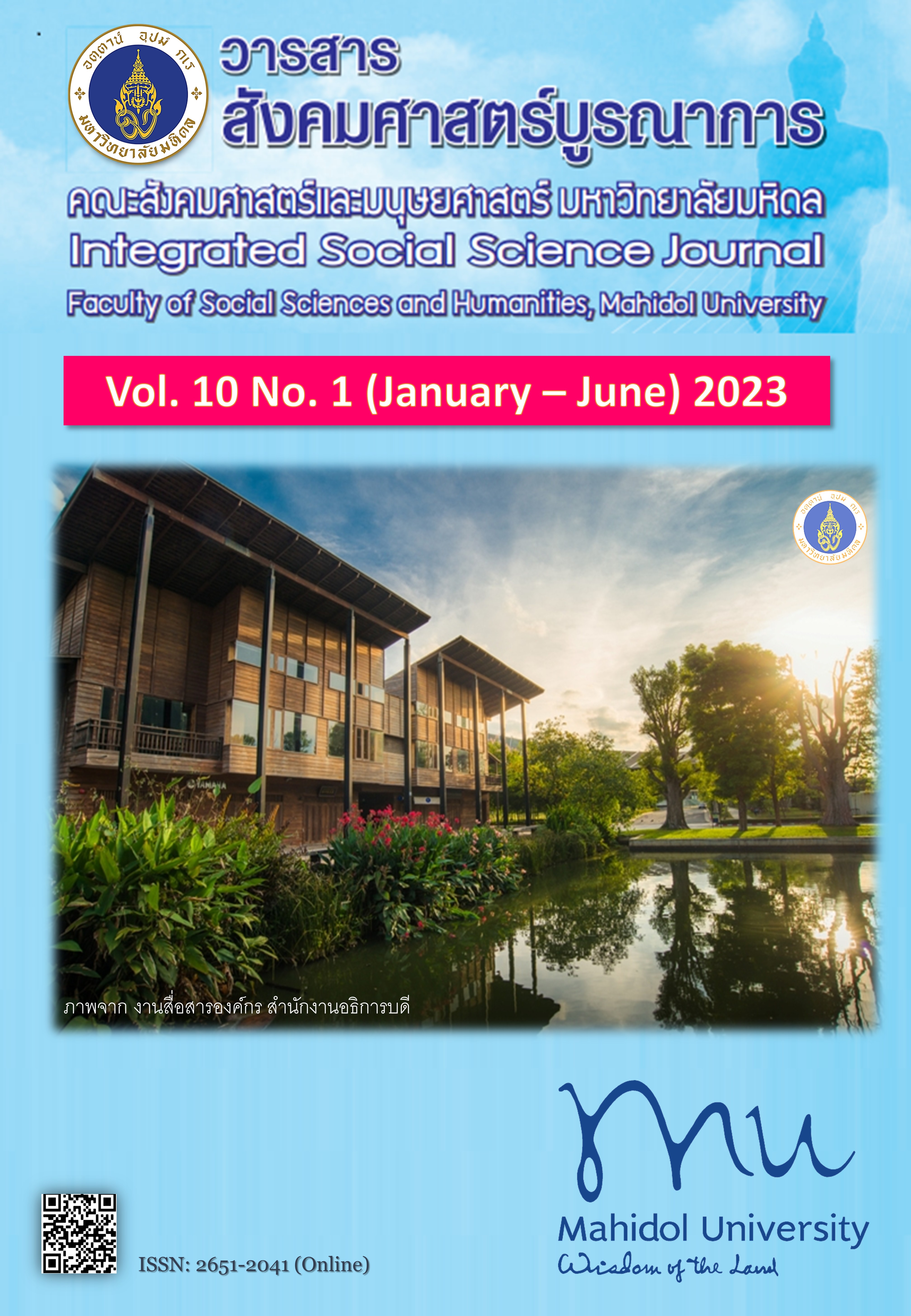กลไกการปฏิบัติงานวิเทศสัมพันธ์ภายหลังการแพร่ระบาดของโรคติดเชื้อไวรัสโคโรนา: กรณีศึกษาคณะสังคมศาสตร์และมนุษยศาสตร์ มหาวิทยาลัยมหิดล
Main Article Content
บทคัดย่อ
บทความวิชาการนี้มีวัตถุประสงค์เพื่อศึกษากลไกการปฏิบัติงานวิเทศสัมพันธ์ของคณะสังคมศาสตร์และมนุษยศาสตร์ มหาวิทยาลัยมหิดล ภายหลังการแพร่ระบาดของเชื้อไวรัสโคโรนา ภายใต้กรอบแนวคิด ทฤษฎี และเอกสารที่เกี่ยวข้องกับงานวิเทศสัมพันธ์และความเป็นนานาชาติของสถาบันอุดมศึกษา ผลการศึกษาพบว่า กลไกการปฏิบัติงานด้านวิเทศสัมพันธ์ของคณะสังคมศาสตร์และมนุษยศาสตร์ มหาวิทยาลัยมหิดลหลังการแพร่ระบาดของเชื้อไวรัสโคโรนา มีทั้งหมด 7 กลไกสำคัญ ดังต่อไปนี้ 1) การกำหนดยุทธศาสตร์ด้านวิเทศสัมพันธ์ของคณะฯ 2) การพัฒนาระบบสนับสนุนงานวิเทศสัมพันธ์ที่สำคัญ 3) การพัฒนาบุคลากรผู้ปฏิบัติงานด้านวิเทศสัมพันธ์ 4) การทำวิจัยและแลกเปลี่ยนองค์ความรู้ระหว่างสถาบันอุดมศึกษาทั้งในระดับชาติและระดับนานาชาติ 5) การเชื่อมต่อใหม่กับมหาวิทยาลัยพันธมิตรเดิมที่ขาดการติดต่อในช่วงสถานการณ์โรคติดเชื้อไวรัสโคโรนาระบาดอย่างหนัก และสร้างเครือข่ายใหม่กับมหาวิทยาลัยต่างประเทศที่มีหลักสูตรสาขาวิชาใกล้เคียงกัน 6) ยกระดับงานบริการวิชาการและวิเทศสัมพันธ์ผ่านระบบออนไลน์ และ 7) การสร้างอัตลักษณ์ของคณะฯ ที่เหมาะสม ให้เป็นที่ยอมรับในระดับนานาชาติ ทั้งนี้กลไกการปฏิบัติงานที่ดีนั้นควรมีระบบประเมินและตรวจสอบการดำเนินการของงานได้ด้วย
องค์ความรู้ใหม่ที่ได้รับจากการศึกษาค้นคว้าครั้งนี้ คือ แนวทางการทำงานด้านวิเทศสัมพันธ์รูปแบบใหม่ที่ไม่ได้ถูกจำกัดเฉพาะแบบ Onsite เท่านั้น การทำงานภายใต้รูปแบบ Hybrid (Online และ Onsite) จะช่วยสร้างความสะดวกและเพิ่มประสิทธิภาพ มีการนำเอาเทคโนโลยีดิจิทัลมาใช้ร่วมกับการปฏิบัติงานด้านวิเทศสัมพันธ์ เช่น การนำเอาโปรแกรมการประชุมออนไลน์ระบบ Zoom Cloud Meetings หรือ Cisco WebEx Meetings มาใช้กับงานเจรจาความร่วมมือและการจัดกิจกรรมผ่านระบบออนไลน์ เป็นต้น นอกจากนี้ การใช้เทคโนโลยีดิจิทัลยังช่วยผู้บริหารและเจ้าหน้าที่เก็บรวบรวมและวิเคราะห์ข้อมูล อันจะเป็นประโยชน์ต่อการตัดสินใจต่าง ๆ ที่เกี่ยวข้องกับการดำเนินงานด้านวิเทศสัมพันธ์ให้มีประสิทธิภาพและประสิทธิผลมากขึ้น
Article Details

อนุญาตภายใต้เงื่อนไข Creative Commons Attribution-NonCommercial-NoDerivatives 4.0 International License.
- วารสารสังคมศาสตร์บูรณาการ มหาวิทยาลัยมหิดล อนุญาตให้สามารถนำไฟล์บทความไปใช้ประโยชน์และเผยแพร่ต่อได้ โดยอยู่ภายใต้เงื่อนไขสัญญาอนุญาต CC Attribution-NonCommercial-NoDerivatives 4.0 International (CC BY-NC-ND 4.0) โดยต้องแสดงที่มา/การอ้างอิงจากวารสาร – ไม่ใช้เพื่อการค้า – ห้ามแก้ไขดัดแปลงเนื้อหา
- ข้อความที่ปรากฏในบทความในวารสารฯ เป็นความคิดเห็นส่วนตัวของผู้เขียนแต่ละท่าน ไม่เกี่ยวข้องกับกองบรรณาธิการวารสารฯ (ซึ่งหมายรวมถึง บรรณาธิการ ผู้ทรงคุณวุฒิในกองบรรณาธิการ หรือ บรรณาธิการรับเชิญ) แต่อย่างใด ความรับผิดชอบองค์ประกอบทั้งหมดของบทความแต่ละเรื่องเป็นของผู้เขียนแต่ละท่าน หากมีความผิดพลาดใด ๆ ผู้เขียนแต่ละท่านจะรับผิดชอบบทความของตนเอง ตลอดจนความรับผิดชอบด้านเนื้อหาและการตรวจร่างบทความเป็นของผู้เขียน ไม่เกี่ยวข้องกับกองบรรณาธิการวารสารฯ
- กองบรรณาธิการขอสงวนสิทธิ์ในการตัดทอน/ปรับแก้ถ้อยคำบางประการเพื่อความเหมาะสม
เอกสารอ้างอิง
คณะสังคมศาสตร์และมนุษยศาสตร์. (2565). About MUSH. https://sh.mahidol.ac.th
นรา สุภัคโรจน์. (2558). การเปลี่ยนแปลง. สำนักพิมพ์ปราณ
มหาวิทยาลัยมหิดล. (2566). แผนยุทธศาสตร์มหาวิทยาลัย ระยะ 20 ปี. https://op.mahidol.ac.th/pl/mahidol_university_strategic_plan_2018-2037
มูลนิธิการศึกษาไทย-อเมริกัน (ฟุลไบร์ท). (2552). ลับคมคนวิเทศ. https://rgj.trf.or.th/main/additional-grant/fulbright-th/
สุวิทย์ เมษินทรีย์. (2553). เมื่อโลกไม่ใช่ใบเดิม. สำนักพิมพ์อินเตอร์เนชั่นแนลวินเทจ.
วัฒนา คุณประดิษฐ์. (2557). วาทกรรมการพัฒนาการศึกษากับการสร้างความเป็นอื่น. http://www.multied.org/UpdateNews/Proposal%20Ph.D/วัฒนา.pdf
De Wit, H., Hunter, F., Howard, L., & Egron-Polak, E. (2015). Internationalization of higher education. https://www.europarl.europa.eu/RegData/etudes/STUD/2015/540370/IPOL_STU(2015)540370_EN.pdf
Hudzik, J. K. (2011) Comprehensive internationalization: From Concept to action. NAFSA.
Knight, J. (2004). Updating the definition of Internationalization. International Higher Education, 33, 2–3. https://doi.org/10.6017/ihe.2003.33.7391
Rumbley, L. E. (2015). Intelligent Internationalization: A 21st Century Imperative. International Higher Education, 80, 16-17. https://doi.org/10.6017/ihe.2015.80.6146


